Many of us can remember running along the beach as a child, chasing the Seagulls until they would fly away from us. Even birds in local parks or gardens that should be used to us seem to fear us. But why are birds so scared of humans?
Birds are scared of humans because they view us as predators that may potentially harm them. This may be an innate response or one learned through behavioral modeling. Like humans and other animals, they have an instinctual mechanism for survival and will flee any approaching threat.
It makes sense to assume that birds could be afraid of humans because we are large and intimidating. However, this opens up a whole range of questions such as “are they born scared of us?” or “are there any birds that don’t fear humans?” Let’s explore those questions and more…
Why Do Birds Fear Humans?
What I am going to do here is explore this question from a place of logic and then back that up with science. In this piece, I’ll highlight some of the numerous studies that have been conducted on birds and how they interact with us.
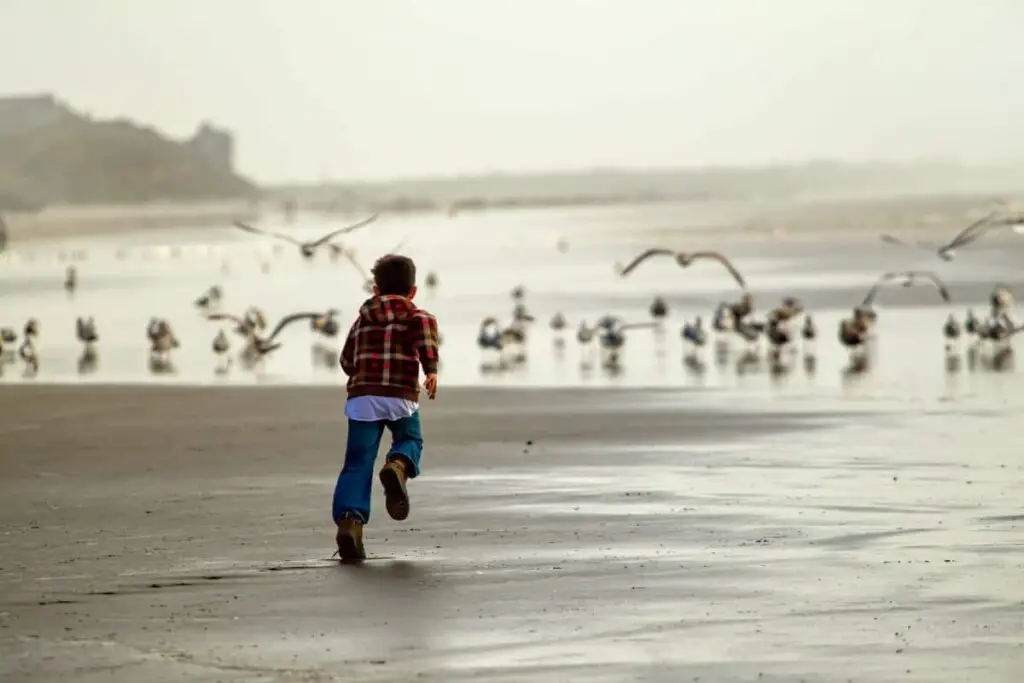
Discover how birds communicate with each other in this article on my blog.
The Logical Reason Birds Are Afraid Of Us
To most birds, an adult human being would be quite an intimidating sight. We are much larger than they are and we have to assume that they do not really know what we are or what our intentions are. In much the same way as we would flee from a charging Elephant, they too turn tail (no pun intended) and run (or fly) from what is a much larger, intimidating animal.
All animals on planet Earth have an inbuilt desire to survive. To ensure the survival of our species, we are driven to eat, drink, find shelter, and reproduce from the moment we are born. In keeping with this survival instinct, we are also driven to avoid mortal danger. This is called the fight or flight response, first described in the 1920s by American physiologist Walter Bradford Cannon.
The fight or flight response is an automatic physiological reaction to something stressful or frightening. The sympathetic nervous system triggers a response in the body, getting it ready to fight or flee. A sudden release of hormones triggers the sympathetic nervous system to stimulate the adrenal glands which causes an increase in heart rate, blood pressure, and breathing rate. Other changes occur in the body such as dilated pupils or trembling muscles.
Learn how birds fly in this article here on the site.
The Scientific Proof

Birds’ dread of people may have its roots in Charles Darwin’s theory of evolution and natural selection. In his Origin Of Species first published in 1859, Darwin talks about “survival of the fittest.” Simply put, this means that Nature will find a way to assure the survival of species that are tough enough or well-equipped to handle life in their respective environments.
This preservation of favorable individual differences and varia- tions, and the destruction of those which are injurious, I have called Natural Selection, or the Survival of the Fittest.
Charles Darwin
It is therefore no stretch of the imagination to think that Nature would instill into all animals a base need to survive and avoid anything that might hurt or kill them.
Looking at Darwin’s theory of natural selection, we could also say that birds may have developed a fear of humanity passed down at a genetic level. The more negative interactions particular birds have had with people, the more likely it is that this fear will be passed down to subsequent generations.
We’ll look at this a little more later in the article…
What Other Things Are Birds Afraid Of?
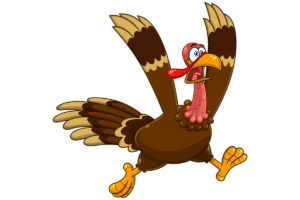
As a whole, birds are afraid of any large thing moving towards or near them. They believe such things to be predators that may harm them. Birds are also afraid of loud noises, flashes of light or shiny objects, and anything different in their environment.
Most birds are fairly small and very light animals. The list of other animals that consider them prey is quite long also and this makes them wary of anything large that moves.
Find out why little birds attack larger birds in this post.
Loud Noises Scare Birds
Birds are possibly scared of loud noises in the same way we can be surprised by them. A car backfire or bursting balloon can make even the most hardened human jump. The way birds hear is different from us also which is why they may have stronger reactions to loud sounds.
Humans and other mammals have 3 ossicles (tiny bones in the inner ear) that transmit sounds from the eardrum to the inner ear. These ossicles are attached to two muscles that contract to reduce the impact of loud noises. Birds have only one ossicle and this theoretically means that loud noises are amplified by about 20-fold?! This would explain why birds fly off when they hear a loud noise.
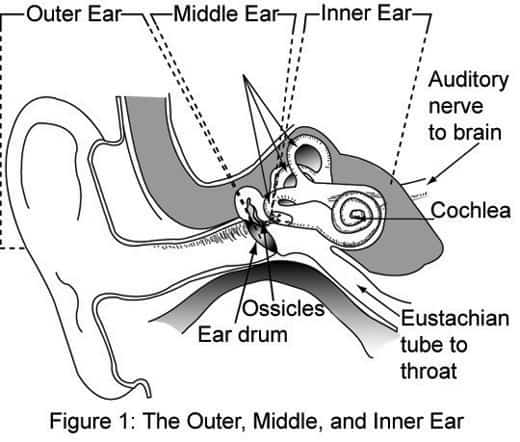
Flashes Of Light
In the same way that we will react to a sudden flash of light, such as a bolt of lightning or the flash on a camera, birds too can be surprised by sudden flashes. To say they are “afraid” of it might be a stretch but as birds have a broader spectrum of vision than we do, it’s possible that a bright flash might affect them differently.
New Things In Their Environment
Most animals will also be curious or wary of something new in their environment and birds are no exception. Any object or animal that appears unexpectedly in the territory of a bird could be a potential threat and so will be treated with a certain apprehension. This behavior can be seen in pet birds when something new is placed inside their cage. It may take them a while to warm up to it.
What Birds Are Not Afraid Of Humans?
Most anyone has seen birds in a park or at a lake where humans often visit. These birds will appear less afraid of humans as they are used to their presence and have learned not to fear them so much. There are however birds that do not seem to fear us at all.
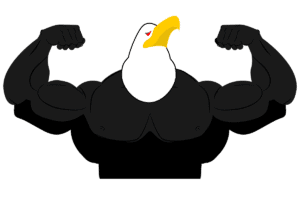
As a general rule, most birds have some fear of humans. Only birds that are accustomed to being fed by humans or birds that are defending their young or a nest will show little or no fear. Hummingbirds and Australian Magpies, Cockatoos, and Rosellas are examples of birds that show less fear when fed.
As a child, I have had personal experience with Crimson Rosellas showing no fear of humans. At Wilson’s Promontory on the Southern tip of Victoria in Australia, the Rosellas used to feed happily from your hands. The birds would swarm down from the trees and sit on your arms, head, and shoulders to get a free feed of seed.
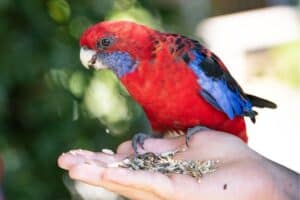
I’m sure that these birds only became this tame after being fed numerous times. The feeding of the Rosellas at Wilson’s Promontory is no longer allowed.
Discover why it is not a good idea to feed birds bread in this article.
I can also attest to the fact that Australian Magpies show absolutely no fear of humans when they are protecting their young. I have been swooped by Magpies while riding my mountain bike along trails and roads in various locations in Victoria. I also still remember the pain of a Magpies beak striking my unsuspecting 8-year-old head as I ran from the milking shed of my parent’s dairy farm.
Another close encounter I have had is with Eastern Yellow Robins. These adorable little birds loved to hang around when my wife and I would rake up leaves on our 2-acre property in Gembrook, Victoria. They would swoop down from a perch atop our woodshed and land right near our feet to grab up a grub or bug they wanted. Once or twice they even landed on our shoes?!
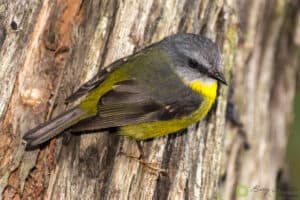
If a certain species has not had much interaction with humans, they are likely to be unafraid. My wife and I saw this in Gentoo Penguins in Antarctica when we visited in 2005. If you stood still for long enough, the Penguins would swarm around you.

Are Birds Born With This Fear?
Here is where we come back to Darwin’s theory of evolution and natural selection. Is it possible that birds are now born with the fear of humans built into their psyche? Is it not possible that because we killed and destroyed the habitats of generations of birds, they now have an established fear of us?
It is plausible that birds may be born with a fear of humans. Studies at the National Academy of Sciences suggest birds are born with anti-predatory responses already in place. In these tests, chicks fled or remained still when presented with approaching threats resembling Raptors searching for prey.
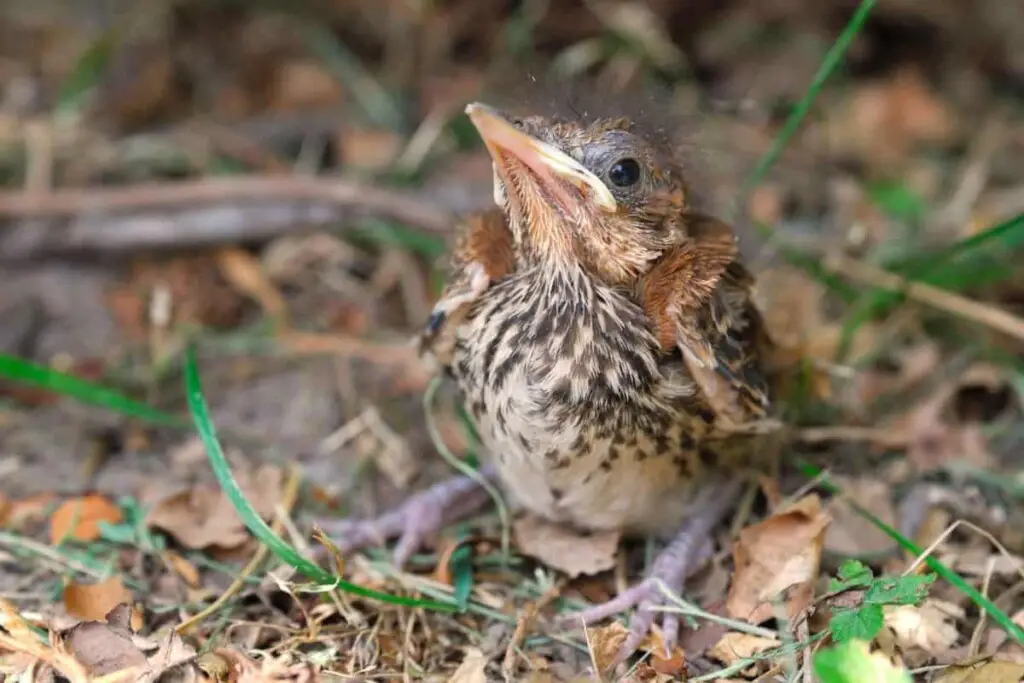
A study by Marie Hébert, Elisabetta Versace, and Giorgio Vallortigara tested baby Chickens that had been hatched in total darkness and not exposed to any overhead movement prior to the test. When presented with various stimuli that mimicked a Raptor hunting for prey incredibly the 4-day-old chicks exhibited behavior that proved they had some understanding of impending danger.
Darwin basically proved this with his theory of natural selection. If nature alters species to adapt to their environment and external threats, then we’d have to say that birds could be born with programming that warns them of the dangers that any predator, including humans, presents.

There is however evidence that might contradict this theory. In his book The Evolution Of Animal Intelligence (1911), S. J. Holmes Ph.D. talks of the Anglo-Argentine naturalist and ornithologist W. H. Hudson who captured Rhea in South America. Though the Rhea had been hunted by the indigenous people for a long time, Hudson found that “the young captured just after hatching would follow him about in perfect confidence. When he would imitate the danger note of the parents the young would rush to him in great terror, although no animal was in sight.”
This evidence, though from a long time ago would indicate that perhaps birds don’t in fact develop a hereditary fear of humans.
The development of species does take place over very long periods of time, sometimes millennia, so it might be possible that certain species have managed to develop this innate fear of humans.
Of course, it can be argued that small birds are simply reacting to any large moving object that may come near them. I would say that kind of reaction would be instinctual for any animal with reasonable vision. I guess it is up to you to make up your own mind here.
Let’s Sum It Up
What can we conclude from the above text? Is there a clear explanation for why birds are afraid of people?
This article has shown that:
- birds view large moving objects as potential predators
- we have hunted birds and predated them for centuries
- we make loud noises which often scare birds
- often we will use bright lights that also scare birds
- Charles Darwin’s theory of evolution suggests the possibility of innate fear in birds
- scientific tests done on chicks prove anti-predatory responses from birth
It would seem that our very existence scares birds. While most of us would not even consider harming a live bird, the birds don’t know that! Just by living out our everyday lives, we may be causing fear in our feathered friends. The cars we drive, the way we encroach on their habitat, and just our very looming presence is intimidating to them.
Next time you are out in nature, spare a thought for the birds you come across. Keep your distance and try not to make any sudden movements or noises that might startle them.
Birds are so beautiful?! A world without them would be a boring world indeed. We must learn to live with them and give them a space to go about their business. The more our population spreads into natural areas, the more we are going to have to learn to co-exist with birds and other animals.
Let’s try to be something they do not need to be afraid of…
References
- The Origin Of Species – Charles Darwin
- Mental Evolution In Animals – George John Romanes M.A., LL.D., F.R.S.
- The Evolution Of Animal Intelligence – S. J. Holmes PhD
- Ossicles – Timothy C. Hain MD
- What Birds Can Hear – Robert C. Beason
- Inexperienced preys know when to flee or to freeze in front of a threat – Marie Hébert, Elisabetta Versace, Giorgio Vallortigara
- How The Fight-Or-Flight Response Works – Kendra Cherry
